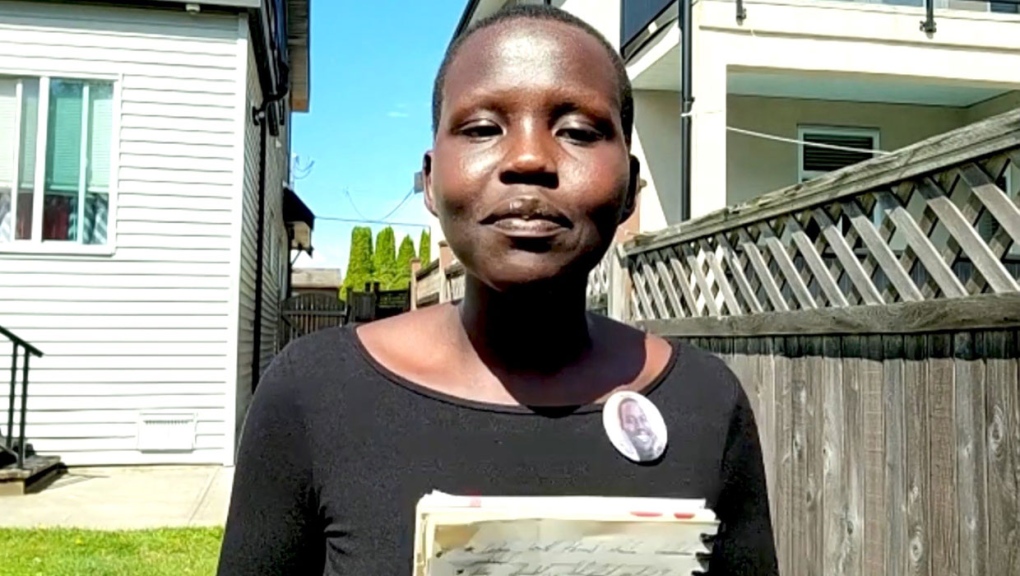Calls increase for Calgary Police to release race-based data
The daughter of a Calgary man shot and killed by police earlier this year is calling for details regarding data the service is collecting about interactions between police and people of colour.
Nyalinglat Latjor called into this month's meeting of the Calgary Police Commission (CPC) from her B.C. home to ask questions about race data.
On Feb. 19 her father, Latjor Tuel, was fatally shot during a confrontation with police.
CPS say officers were called to Forest Lawn for a man in distress, and add he assaulted a police dog moments before the shooting took place.
Since the incident, Tuel's family and friends say he suffered from mental health struggles and have criticized the lethal use of force by police.
His daughter says data about police interactions broken down by race will reveal systemic racism within CPS.
"You can't even begin to change anything without admitting there's a problem first," said Latjor.
She says Calgary should follow Toronto Police Service's lead, which has been required by provincial legislation to collect race-based data for 2020.
The report released earlier this month found 39 per cent of people Toronto police used force against in 2020 were Black.
It also found Black residents were more likely to have a police officer point a firearm at them when they appeared to be unarmed than white people.
Toronto's police chief publicly apologized.
Police Chief Mark Neufeld said CPS is collecting data is being collected as a moral responsibility, and is working with the Canadian Association of the Chiefs of Police and Statistics Canada to collate the data being collected; and requires intense processing before it can be released.
"I look forward to being able to see what comes of that down the line and be able to work with that data and within the community and to improve the broader system," said Chief Neufeld.
When CTV News asked Latjor on Thursday for her response to the chief's comments, she says she wants to see immediate action.
"I felt like that was sticking a Band-Aid on a gaping wound. I felt like that was just empty words," said Latjor.

The chief was also asked about any reports of non-compliance from officers wearing thin blue line patches or badges since they were banned May 31.
Thin blue line patches have recently become associated with white supremacy by critics, while supporters of the symbol say officers wore them to honour fallen service-members.
Neufeld said he hadn't heard any complaints since then, and any modifications to uniforms or police cruisers are not allowed.
As for the race data Latjor is looking for, he says preliminary data will be released later this year. No specifics will be released at this time.
The CPC chair said work is underway and the commitment to anti-racism continues.
The Alberta Serious Incident Response Team is still investigating the incident.
CTVNews.ca Top Stories

Can the Governor General do what Pierre Poilievre is asking? This expert says no
A historically difficult week for Prime Minister Justin Trudeau and his Liberal government ended with a renewed push from Conservative Leader Pierre Poilievre to topple this government – this time in the form a letter to the Governor General.
opinion Tom Mulcair: Prime Minister Justin Trudeau's train wreck of a final act
In his latest column for CTVNews.ca, former NDP leader and political analyst Tom Mulcair puts a spotlight on the 'spectacular failure' of Prime Minister Justin Trudeau's final act on the political stage.
B.C. mayor gets calls from across Canada about 'crazy' plan to recruit doctors
A British Columbia community's "out-of-the-box" plan to ease its family doctor shortage by hiring physicians as city employees is sparking interest from across Canada, says Colwood Mayor Doug Kobayashi.
Ottawa MP Mona Fortier appointed chief government whip
Ottawa-Vanier MP Mona Fortier has been appointed as chief government whip, the latest addition in a major reshuffle of Prime Minister Justin Trudeau's cabinet.
Two U.S. Navy pilots shot down over Red Sea in apparent 'friendly fire' incident, US military says
Two U.S. Navy pilots were shot down Sunday over the Red Sea in an apparent 'friendly fire' incident, the U.S military said, marking the most serious incident to threaten troops in over a year of America targeting Yemen's Houthi rebels.
'There’s no support': Domestic abuse survivor shares difficulties leaving her relationship
An Edmonton woman who tried to flee an abusive relationship ended up back where she started in part due to a lack of shelter space.
opinion King Charles' Christmas: Who's in and who's out this year?
Christmas 2024 is set to be a Christmas like no other for the Royal Family, says royal commentator Afua Hagan. King Charles III has initiated the most important and significant transformation of royal Christmas celebrations in decades.
OPP find wanted man by chance in eastern Ontario home, seize $50K worth of drugs
A wanted eastern Ontario man was found with $50,000 worth of drugs and cash on him in a home in Bancroft, Ont. on Friday morning, according to the Ontario Provincial Police (OPP).
Baseball Hall of Famer Rickey Henderson dead at 65, reports say
Rickey Henderson, a Baseball Hall of Famer and Major League Baseball’s all-time stolen bases leader, is dead at 65, according to multiple reports.

































